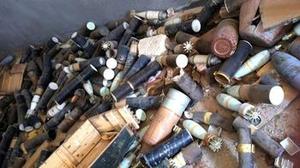Middle EastSinai Peninsula lawlessness worries terrorism experts
The other day, Egyptian forces seized a large quantity of weapons near the Libyan border; Egypt says the large weapon shipment was bound for the Sinai Peninsula further to destabilize the area and stir up trouble ahead of upcoming presidential elections

Libyan weapons have been making their way into the Sinai // Source: giaoduc.net.vn
A central element of the 1979 peace agreement between Israel and Egypt has been the demilitarization of the Sinai Peninsula, which Israel occupied in the 1967 Six Day War. Israel completed its withdrawal from Sinai in 1982, but the peace agreement allowed only small, lightly equipped Egyptian forces to patrol the vast and largely empty territory.
The area was largely stable for the next twenty-five years, but in 2007 the Islamic Hamas movement took over control of the Gaza Strip, and matters have been deteriorating ever since. Iran, a mentor of Hamas, began shipping large quantities of arms to Hamas. Iranian ships would ferry missiles, rockets, and other weapons to the southern tip of Sinai, and Bedouin tribesmen would then carry them north to the Gaza Strip. The few Egyptian soldiers and policemen keeping an eye on the area did little to stop them.
The Egyptian government began to pay more attention to the going on in the peninsula in 2010, when Egyptian intelligence units captured a dozen or so Hezbollah operatives in Sinai, sent there by Iran as part of an Iranian scheme to destabilize the Mubarak regime.
The growing Egyptian attention to the security situation in Sinai was cut short, however, after the fall of Hossni Mubarak in February 2011. The Egyptian military became absorbed by domestic politics, and many of the leaders of the popular uprising against the Mubarak regime, especially the Islamist groups, portrayed security efforts in Sinai as nothing more than an effort by a corrupt Egyptian regime to offer security to Israel at the same time that the latter was still preventing the emergence of an independent Palestinian state.
Many Israeli analysts now say that the situation in the Sinai Peninsula would soon resemble the situation in tribal areas of Pakistan: Sinai would still be, nominally, an Egyptian territory, but it would not be under a meaningful Egyptian control.
What does not help the situation is Israel’s refusal to renegotiate the number of Egyptian forces allowed in the Sinai – and the type of military gear they can employ – as set in the 1979 peace treaty between the two countries. Israel is worried that strengthening the Egyptian military presence in Sinai would, at some point, pose a threat to Israel, especially against the backdrop of growing instability in Egypt and unanswered questions about the policy direction of a future Egyptian government.
At the same time, Israel has been reluctant to take military actions of its own to restore order to the increasingly lawless territory. The relationship between Israel and post-Mubarak Egypt is tense enough without Israeli incursions into Egypt.
At lease, away from Sinai, the Egyptian security forces appear to be on guard. The other day, Egyptian forces seized a large quantity of weapons near the Libyan border. Egypt says the large weapon shipment was bound for the Sinai Peninsula further to destabilize the area and stir up trouble ahead of upcoming presidential elections.
Ha’aretz reports that the seized arsenal, carried on three vehicles, included forty surface-to-surface missiles, seventeen rocket-propelled grenade launchers, mortar rounds, automatic rifles, and around 10,000 artillery shells. The vehicles were captured near the Mediterranean resort city of Marsa Matrouh, some 430 kilometers (270 miles) northwest of Cairo.
Three Egyptian Bedouin smugglers were also arrested. Two of them were from the Egyptian town of Rafah on the border with the Gaza Strip.
The smuggling of weapons from the armories of the Col. Qaddafi to Hamas is not new. As the hold of Qaddafi on the country weakened, anti-Gaddafi rebels sold Iran hundreds of nerve and mustard gas munitions from abandoned Libyan military bases. Iran bought the munitions on behalf of Hamas and Hezbollah. Last April, Israeli special forces, in a daring raid into Sudan, killed two top level Hamas operatives who were on their way to Libya to arrange for the shipment of the chemical munitions to Gaza.
